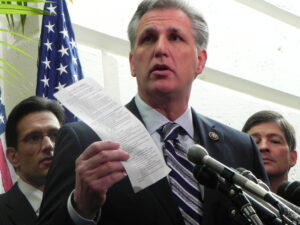How Careless Political Friction Affects Public Opinion
Published on February 16, 2023, at 6:49 p.m.
by Ginger Morrow.
The United States government is not without its fair share of public controversies. Some, however, inordinately capture the public’s attention, and one such example is the tumultuous election of the now-U.S. House Speaker Kevin McCarthy.
Four days and 15 rounds of voting amounted to a historically long negotiation process that flooded the news cycle. The public scrutiny came as a surprise to many onlookers.

Why did we all care about this so much?
This type of administrative vote would normally fly under the public’s radar like the House office lottery, but a few special circumstances set this particular election apart.
First, this was the first time in a century that the House Speaker election required more than one vote.
Second, the emergence of the House Freedom Caucus has drawn attention to the divisions within the Republican party more than ever before. Controversial figures like Reps. Marjorie Taylor Greene and Lauren Boebert stir millions of supporters and detractors with every tweet that falls out of the political norm.
Third, the public loves a good Shakespearean drama. Reality TV has captured the American imagination, and the theatrics of Congress is life imitating art. The human interest component of the story is even reflected in cable news and C-SPAN ratings. House members were spotted dozing off and reading comics throughout the grueling four days. Rep. Mike Rogers lunged at Rep. Matt Gaetz following Gaetz’s continued resistance to McCarthy, which included nominating Trump for speaker even after Trump publicly endorsed McCarthy. McCarthy himself was caught on camera engaging in several verbal spats with skeptical House Republicans.
Memes and bad lip reading videos emerged from the proceedings and were viewed millions of times by people who probably wouldn’t care enough about this election to watch it in any other year, let alone comment on it or create content related to it. Talk about a crisis communications nightmare.
The aftermath
McCarthy’s Twitter went silent during the voting process, and his communications team did not put out press release or other formal acknowledgment of the controversy. His only statements were to reporters in the halls of Congress, who he assured that his election was imminent and the debate was “healthy.” The strategy here seemed to be to weather the storm, and a majority of Republicans were favorable toward the eventual outcome. That said, the process still impacts the public perception of the GOP, especially going into an election cycle with the goal of ousting a Democrat incumbent.

From the outbreak of the crisis, the opposition was already predicting the party’s downfall. Republicans now have a measly 628 days to resolve their near-constant friction among leadership and convince the public that they are the right choice for our nation. That’s a very tall order.
The Republican National Committee’s refusal to acknowledge any divisions may be a strategic move in itself, especially considering the party’s history with independent factions like the Tea Party. But in times like these, it’s hard to understand why the GOP isn’t quelling this national embarrassment.
Unity is what the Republican party is missing now, but borderline silence in the moments that matter the most and leaving critical leadership out to dry will not inspire undecided voters. Progress begins with consistent messaging and anticipating PR crises before they have a chance to take hold in the public square.




